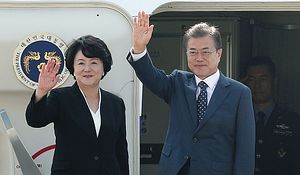Speaking in Paris, France, during an official bilateral visit, South Korean President Moon Jae-in directly raised the prospect of providing North Korea with some relief from United Nations sanctions for its steps toward denuclearization. Moon made the remarks at a joint press conference with French President Emmanuel Macron at the Elysée Palace in Paris.
“I believe the international community needs to provide assurances that North Korea has made the right choice to denuclearize and encourage North Korea to speed up the process,” Moon remarked at the joint press conference.
“Chairman Kim Jong-un has said he is willing to not only halt the country’s nuclear and missile tests and also dismantle its production facilities, but also dismantle all nuclear weapons and nuclear materials it currently possesses if the United States takes corresponding measures,” Moon additionally told Macron, referencing language that appeared in the September 19 joint declaration that he and Kim Jong Un agreed to in Pyongyang during the fifth inter-Korean summit meeting, the third between Moon and Kim this year.
“We must further encourage North Korea’s denuclearization process by easing U.N. sanctions when and if we decide the North’s denuclearization process has at least reached a point of no return, and I ask President Macron to play such a role as [the leader of] a permanent member of the U.N. Security Council,” Moon noted, directly asking Macron to play a role at the United Nations Security Council.
Sanctions relief is quickly turning into a hot-button issue and North Korea has in recent weeks made its demands explicit. Speaking before the United Nations General Assembly in September, North Korean Foreign Minister Ri Yong Ho outlined a case for sanctions relief. He noted that the “UNSC poured down on us numerous ‘sanctions resolutions’ making issue of our nuclear tests and rocket test launches.” Ri continued that given North Korea’s unilateral decision earlier this year to cease nuclear testing and intercontinental-range ballistic missile flight-testing, sanctions should have been relaxed.
North Korea hasn’t made it explicit what the “corresponding measures” referenced in the September 19 declaration would entail, but it appears increasingly likely that sanctions relief is among these measures. A commentary in North Korea’s state-run Korean Central News Agency argued that the United States was “still trying to subdue someone by resorting to sanctions, oft-repeating the story about escalation of sanctions pressure on the DPRK.”
The commentary made clear that sanctions relief would have to come for further action by North Korea on concessions related to denuclearization, including any potential action at the Yongbyon nuclear complex, which was hinted at in the September 19 inter-Korean declaration.
It’s unsurprising now to see Moon calling for sanctions relief, but South Korea is in a difficult position. Throughout this year, we’ve seen inter-Korean rapprochement proceed along several axes, with military-to-military talks, people-to-people exchanges, sports diplomacy, family reunions, and other activities all picking up. Economic cooperation, however, has still not materialized.
When in Seoul earlier this year, members of the South Korean government and independent experts alike were quite clear that Seoul harbored no illusions about the kinds of cooperation that would be possible under the existing sanctions regime, which tightened considerably in 2017 amid North Korea’s unprecedented missile and nuclear-testing campaign. But now, with three inter-Korean summits behind him and an upcoming visit by Kim Jong Un to Seoul potentially later this year, Moon is making South Korea’s interest in sanctions relief apparent.
But Seoul’s desires won’t make a difference until the five permanent members of the United Nations Security Council can agree that North Korea’s demonstrated behavior will merit relief. So far, only Russia and China — who actually signed onto a trilateral memorandum with senior North Korean diplomat Choe Son Hui earlier this month — support sanctions relief.
France, the United Kingdom, and the United States haven’t come around yet. Even Macron made it clear to Moon in Paris that France supported sanctions and pressure on North Korea until the country was fully denuclearized, showing no interest in using sanctions relief as a short-term tool to induce and encourage Pyongyang toward further steps as Moon was proposing. That suggests we won’t be seeing sanctions relief for North Korea anytime soon.

































